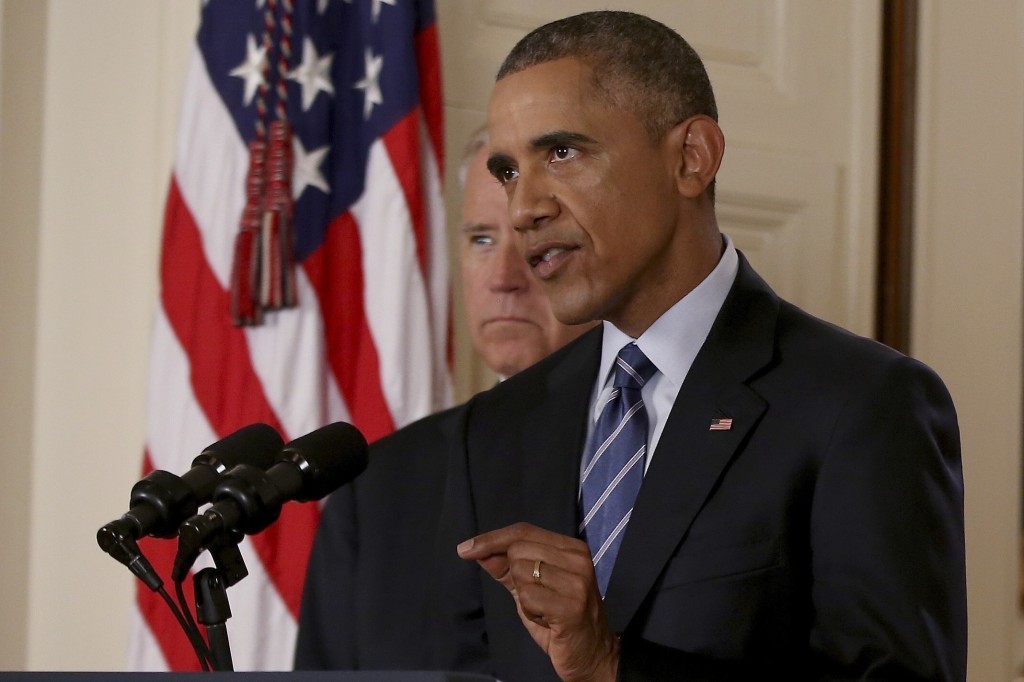
The Keystone XL review suddenly looks like a priority for the Obama administration, and cheap oil may be part of the reason.
After dragging its feet for years to dodge one of the most contentious energy issues during President Barack Obama’s time in office, the administration took only a couple of days to deny a TransCanada Corp. request to pause the process while the company sought approval in Nebraska.
The collapse of crude prices in the face of the US shale boom has lowered gasoline prices, weakening an argument for the $8-billion project that resonated with American voters. This has paved the way for Obama to focus on one issue that’s very dear to him: climate change.
“The political pressure on oil and gasoline prices dissipated to such an extent that the president has a freer hand,” said Paul Bledsoe, a Washington-based energy consultant who was a White House aide under Bill Clinton. “The president has become increasingly determined to act to protect America from the worst eventualities of climate change.”
Obama has been critical of Keystone XL, and while Republican presidential candidates for the 2016 election have shown support for the project, Democratic candidates have said they oppose it.
The denial of a pause in the review is the latest blow to a project that’s been under consideration by the US for more than seven years and has split lawmakers, while hurting relations with Canada, which is seeking to expand markets for its crude. The request was seen by some analysts as an attempt to circumvent an expected rejection by Obama, which the company denied.
“It’s the death of the project as long as Obama’s president,” Bob Schulz, a professor at the University of Calgary’s Haskayne School of Business, said in a phone interview. “There’s zero percent probability Obama’s going to say ‘Yes.”’
The US State Department in April 2014 halted its review for months over legal uncertainty about the path in Nebraska. But that was before crude’s drop lowered gasoline prices at the pump.
The State Department said Wednesday that it has notified the company that the review will continue. The department was responding to a letter on Monday to Secretary of State John Kerry, in which TransCanada requested a suspension of the assessment while Nebraska regulators conduct their own.
“We’ve told TransCanada that the review process will continue,” State Department spokesman John Kirby told reporters in Washington Wednesday, a day after the White House said the review would be completed by the end of Obama’s term. Kirby said Kerry wanted to finish work on the review after “all that has gone into it.”
The pipeline builder pledged to keep trying to advance the project.
“Our efforts will continue to demonstrate that Keystone XL is in the national interest of the United States,” Mark Cooper, a spokesman for the Calgary-based company, said in an e-mail on Wednesday.
Keystone XL would span 1,179 miles (1,897 kilometers) from Alberta through three states — Montana, North Dakota, and Nebraska — before connecting to an existing pipeline network supplying US Gulf Coast refineries.
Supporters argue the project would create jobs, open markets for Canadian crude and displace U.S. imports of crude from the Middle East and Venezuela. The project is one of four major pipeline proposals designed to carry rising volumes of oil-sands bitumen that are delayed amid environmental opposition. Both supporters and opponents of the project have debated its potential impact on US gasoline prices. As the cost of filling up fuel tanks has fallen, the debate has become irrelevant.
Environmental activists have spent heavily in hopes of defeating a project they say would drastically increase emissions blamed for global warming by enabling development of the oil sands.
Frank Benenati, the White House press secretary, declined to comment on Wednesday and referred questions to the State Department. A day earlier, the White House press secretary had cast doubt on the justification for halting the review.
TransCanada Chief Executive Officer Russ Girling, on a Tuesday earnings conference call, said the company’s request had nothing to do with politics and was meant to let the outcome of a regulatory assessment of the pipeline in Nebraska be considered in the State Department’s review. The Nebraska review is due to extend well into 2016.
The bid by the company now looks like an unsuccessful move in a game of chess, said Martin Pelletier, managing director and portfolio manager at TriVest Wealth Counsel Ltd. in Calgary.
“They clearly saw a potential checkmate on the horizon and they made their best counter move and the U.S. just called them on it,” Pelletier said. He predicted Obama will deny the line instead of leaving it to his successor, to secure his environmental legacy. “You’ll get a rejection.”